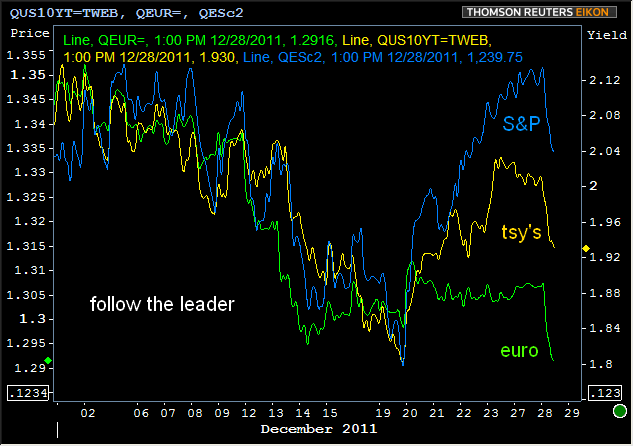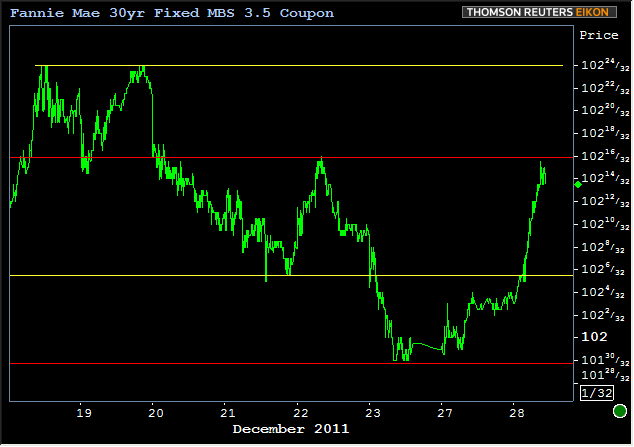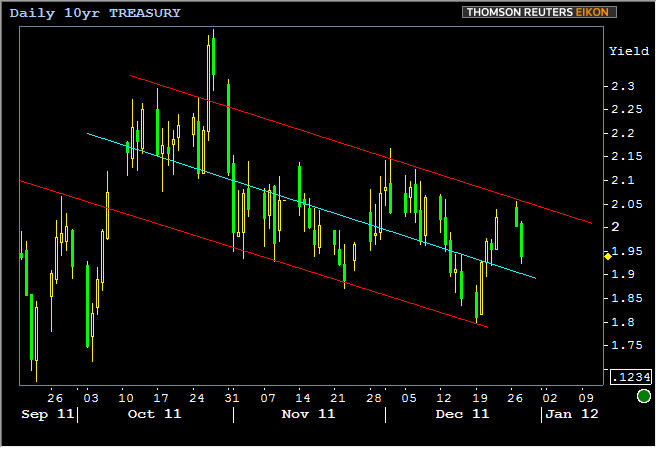The cliche quip "It's the economy, stupid" is under consideration to be revised to "it's the European economy, stupid," or perhaps even "it's the stupid European economy, stupid." Any way you slice it, there are only so many reasons that domestic markets wouldn't react at all to a decent reading on Consumer Confidence yesterday (plus a million other domestic economic reports in the past), instead making a more significant move on a day without economic data: (it's the European economy).

First of all, a constant caveat remains in effect as far as low volume is concerned. Despite being improved versus yesterday, overall volume remains exceedingly low, exaggerating the movements when sufficient motivation is mustered to move things at all (unlike yesterday, which was entirely flat). Now today, we have a few possible candidates driving the Euro lower, which in turn is bringing Treasury yields with it. Don't think of these two as being tied together in a major fundamental sense. The correlation has more to do with the Euro and US 10yr Note being widely regarded as proxies for the risk sentiment surrounding the European debt crisis. Recently, a flat and uninspired Euro, rising from recent lows caused little concern for 10yr yields busily engaged in an aimless year-end drift higher. But whether it's today's Hungary/IMF news or cold-feet heading into more sovereign debt auctions, the Euro broke to it's lows of the year. Everything that's happened since is merely a reaction to that--a broad but minor repricing of risk based on a European Benchmark...
Here's some more background on the Hungary/IMF comment above as seen in the last alert from MBS Live:
Stocks Fall on Limited Headlines. Bonds Nonetheless Benefit 10:16 AM This one's a bit of a stretch, largely because the news that's ostensibly moving markets isn't really news at all and also because, well.... it's about Hungary.
No offense to Hungary in the slightest, but if we had any other news today, this wouldn't be having much of an effect on markets. Furthermore, it's not much of a shock coming from a country most recently in the news for wanting to make it's central bank independent.
Today's news is that the IMF has basically said that it won't continue to engage in negotiations to provide funding for Hungry unless the latter "demonstrates its willingness to engage on policy issues that are relevant to macroeconomic stability."
In other words, "Dear Hungary, play ball or no extra funding for you."
Although it's questionable as to whether or not Hungary actually needs IMF funding for any pressing reasons, on a day with volume as low as it is, this has been enough to drag the risk-on sentiment down, starting in Europe, but also being felt in lower domestic equities and bullish bond markets. Again, the amount of movement in domestic markets doesn't correlate to the news and is merely magnified by what is still exceedingly low volume.
As Benchmark Treasuries have gone, so go MBS--simply doing their best to keep pace:
This 102-16 level is recently seen as a resistance level for MBS, but not an absolute high by any means:

Further supporting the possibility (carefully chosen word there, as opposed to "probability") that MBS would be willing to move further is the fact that--at least in one way of looking at recent trends--10yr yields have been gradually improving in this channel, and that today's gains haven't even brought them to the midpoint of that channel yet. Translation: bond markets haven't yet rallied to unbelievably high levels from which they certainly and must necessarily plummet. A continuation is by no means guaranteed, but certainly deserves to be included in a list of possibilities (assuming that we should even care much about that given the low volume, which we probably shouldn't):

Low volume or not, the gains seen thus far are good enough for a few lenders to reprice for the better.





